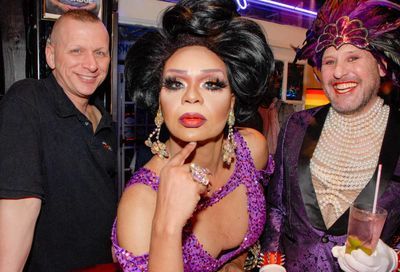Rescue from the Right
A Town Square Opinion
It’s October, and the leaves are turning Code Orange and Red. But just when we were expecting another conveniently timed terror alert, the Republicans have begun self-destructing. Suddenly, there appears an increased likelihood that they will lose at least one house of Congress, if only due to their inept handling of a scandal and not because they are shredding the Constitution, recruiting enemies faster than our soldiers could ever kill them, and bankrupting America.
While it is a relief to see Republicans firing at each other for a change instead of at the rest of us, we cannot count on it to last. The fact that the ruling party’s bumbling militarism, extra-legal methods and imperial arrogance toward the rest of the world have advanced democracy neither at home nor abroad is insufficient to swing the election unless enough conservatives join liberals in this conclusion.
Into the breach steps multi-threat blogger, columnist, pundit and famous homosexual Andrew Sullivan, offering a conservative antidote to George W. Bush’s toxic alchemy of politics and fundamentalism. Sullivan’s new book, The Conservative Soul: How We Lost It, How to Get It Back, published last week, is a harsh assessment of the current Republican Party.
Describing the president’s refusal to hear alternative viewpoints, inability to concede error, and virtual treason charges against his critics, Sullivan argues that the best way to understand Bush is in the light of his born-again conviction that he is on a mission from God.
When Bush described civil marriage as ”a sacred institution,” he was doing more than appealing to his evangelical base by attacking gays. He was seeking to usurp states’ rights, violate the Establishment Clause and erode the secular public square in which Americans negotiate their differences.
As Sullivan observes, fundamentalists are threatened not only by homosexuals but by the entire modern world: ”If you take your beliefs from books written more than a thousand years ago, and if you believe in these texts literally, then the appearance of the modern world must truly terrify.” This fear leads to a retreat into denial masked by certitude. Pope Benedict XVI, for example, insists that no one’s conscience is authentic if it differs at all from his medievalist views. Sullivan compares this to the old Marxist line about ”false consciousness.”
Sullivan devastatingly dissects the theocons’ recourse to ”natural law,” which comes from Aristotle by way of Aquinas and serves mainly to mask a religious purpose. For example, the view of sex held by natural lawyers like Robert P. George renders even most heterosexual sex ”unnatural.” Sullivan notes that one sign of sex having natural functions beyond reproduction is the existence of the clitoris, which is not essential for reproduction but is the main source of a woman’s sexual pleasure. The trouble with the theocon idea of nature is that it is based not on empirical observation but on abstract notions of what things are ”for.”
One of the most chilling illustrations of Bush’s fundamentalist politics, Sullivan writes, was his handling of the Terri Schiavo case. This president who resisted interrupting his vacation to deal with Hurricane Katrina flew back to Washington to sign a bill purporting to save a woman who had been in a persistent vegetative state for 15 years.
Sullivan, inspired by Montaigne’s amused sense of human fallibility, proposes a conservative politics of modesty and restraint based on individual citizens’ freedom to pursue happiness rather than on a centralized imposition of virtue. He states, ”The defining characteristic of the conservative is that he knows what he doesn’t know.”
Sullivan’s case for ”the conservatism of doubt” is buttressed by a luminous discussion of British philosopher Michael Oakeshott. Oakeshott rested his philosophy on skepticism rather than dogma, stressed the contingency of human existence, and taught that the proper function of politics is not to press a particular result but to secure freedom.
The book’s tone is not lecturing but conversational. Sullivan is most eloquent when he describes how Jesus talked in parables, offered more questions than answers, and commanded his disciples to love one another. Sullivan contrasts this with the religious right’s shrill bossiness, mega-churches that resemble shopping malls, and obsessive slanders against gay people.
At a Cato Institute discussion of Sullivan’s book on Oct. 3, conservative columnist David Brooks argued that the GOP’s excesses stem more from partisan tribalism than from fundamentalism. He has a point: Those in power have been allowing partisan interests to trump their principles since the dawn of the republic. Reports on the Mark Foley scandal suggest that House Republican leaders were more concerned about the pots of money Foley raised for them than about his improper conduct. Furthermore, the use of evangelical rhetoric by prominent Republicans such as Tom DeLay appears entirely cynical. But the fundamentalist political furor that Bush and his allies helped unleash is no less dangerous for the instigators’ impure motives.
The theocons may not be able to revive the glories and certitudes of Christendom, but they can do a lot of damage to our country while they try. Sullivan counters them not with a program but with an alternative political philosophy. At a time of anti-immigrant fear-mongering, it is fitting that this privileged immigrant should call on his adopted country to heed the better angels of its nature and stand up to its religious bullies. As his admirable book shows, the best way to defend liberties under threat is to exercise them vigorously.
Richard J. Rosendall is a writer and activist whose work has appeared on Salon.com and the Independent Gay Forum. He can be reached at rrosendall@starpower.net.
Support Metro Weekly’s Journalism
These are challenging times for news organizations. And yet it’s crucial we stay active and provide vital resources and information to both our local readers and the world. So won’t you please take a moment and consider supporting Metro Weekly with a membership? For as little as $5 a month, you can help ensure Metro Weekly magazine and MetroWeekly.com remain free, viable resources as we provide the best, most diverse, culturally-resonant LGBTQ coverage in both the D.C. region and around the world. Memberships come with exclusive perks and discounts, your own personal digital delivery of each week’s magazine (and an archive), access to our Member's Lounge when it launches this fall, and exclusive members-only items like Metro Weekly Membership Mugs and Tote Bags! Check out all our membership levels here and please join us today!























